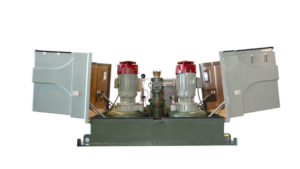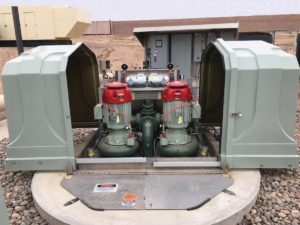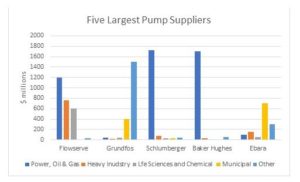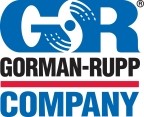Georg Fischer: The Structural Programme Makes an Impact
The first-half results of the Georg Fischer Corporation reflect the global crisis in the markets. Sales were 39% below the level reported in the excellent first six months of 2008. The operating result (EBIT) comes to CHF –122 million, a figure that includes CHF 59 million in one-off special charges for the current structural programme.
GF Automotive and GF AgieCharmilles were especially hard hit by the downturn, while GF Piping Systems was less severely affected. The structural programme announced in May 2009 is on track and is already having a positive impact that will intensify in the course of the year. Operating and personnel costs in the first half of 2009 were reduced by 26% compared with the same period the previous year.
Georg Fischer generated a turnover of CHF 1,448 million in the first half of 2009, compared with CHF 2,383 million in the same period the previous year. Adjusted for currency fluctuations and changes in the scope of consolidation, the decline was 38%. GF Automotive and GF AgieCharmilles saw sales decline by about half, GF Piping Systems by about 15%. The crisis has affected all segments and regions, though to a varying degree.
The operating result (EBIT) before special charges stood at CHF –63 million at mid-2009. The measures taken have increasingly made their impact felt so that the operating loss before special charges was 60% lower in the second quarter than in the first. In addition, the first-half figures include one-off special charges to EBIT amounting to CHF 59 million. The net loss for the first six months was CHF –139 million.
Free cash flow came to CHF –125 million. Receivables and inventories were reduced by CHF 139 million. The decline in sales and the cuts in investment spending led to a sharp fall in payables to suppliers. This effect was intensified by the decrease in production volume, which was kept low in order to reduce inventories. Net working capital increased slightly as a result. Investments in property, plant and equipment were reduced sharply by 20% to CHF 72 million compared with the same period a year ago. The negative free cash flow has increased net debt to CHF 702 million. New lending terms (covenants) were negotiated with the banks for the syndicated loan, and the conditions are being met. A new loan agreement is being drafted. The equity ratio is still a very solid 42%.
The structural programme is working effectively
Georg Fischer launched a broad-based structural programme in the first half of 2009 in order to sustainably reduce the Corporation’s overall costs by CHF 350 million by 2012. The goal is to post an operating profit in 2010, to generate an EBIT margin of 8% and to decrease net debt to below CHF 400 million by 2012 at the latest. Georg Fischer believes that the worst will be over in 2009 but that a sustainable upswing is not likely before 2011.
The implementation of the structural programme is in full swing. It involves drastic cost-cutting measures, adjustments to capacity and structures, and divestment of assets not essential for operations. The Corporation announced the programme on 28 May 2009. Most of the measures will be completed by the end of 2009. Georg Fischer will take a special charge of about CHF 100 million to the 2009 annual accounts, of which CHF 59 million is included in the statement for the first half of 2009.
The savings already reduced operating and personnel costs by CHF 260 million or 26% in the first six months of the year. Short-time work continued in June 2009 at a lower level. 4,000 employees are affected. Where short-time work is not possible, working hours have been reduced and wages adjusted accordingly. As of May, the fixed salaries of the Executive Committee and of 250 senior managers were lowered by 10%, and the fixed salary of the CEO and the cash compensations of the Directors were decreased by 20%.
The three Corporate Groups have launched a number of long-term structural adjustments.
GF Piping Systems is consolidating production at Georg Fischer TPA S.r.l. at one location in Busalla and is pooling its Swiss building technology operations at the newly acquired firm of Georg Fischer JRG AG in Sissach. The entire organisation was streamlined as of 1 July 2009.
GF Automotive is adjusting structures and production capacity to demand. In the light metal segment, it has already sold its Gleisdorf foundry, and negotiations are being conducted to sell the Garching plant. The Herzogenburg site is being streamlined and restructured. Production in Canada is being shifted to China.
In view of the ongoing crisis, GF AgieCharmilles is speeding up efforts to focus its production sites in Switzerland. Production in Schaffhausen will be moved to Nidau by the autumn. The global sales organisation has been streamlined in recent months. The Corporate Group is forging ahead with measures to lower costs, trim the product range and speed up product development.
The implementation of the structural programme will bring about a Corporation-wide reduction in payroll of 2,300 positions or 16%. Some 1,300 positions worldwide were cut in the first half of 2009.
Corporate Groups
GF Piping Systems reported sales of CHF 529 million in the first half of 2009. This is equivalent to a decline of 15% versus the very strong first semester 2008 (22% adjusted for currency fluctuations and acquisitions). One reason for the downswing was the unusually severe winter, which hampered sales in the infrastructure business. Turnover in America and Asia was the least affected, whereas sales in Europe fell more sharply. Operating profit (EBIT) before special charges improved in the second quarter and came to CHF 30 million for the first half (ROS 6%). The new fittings plant in Ratnagiri, India, started up production. It will enable local customers to satisfy the substantial demand in India for water and gas utility products. The production site that opened last year in Malaysia is enjoying strong order intake. This year another plant will be commissioned in China. An upswing is taking shape mainly in the infrastructure business (water and gas utilities). On the whole, the Corporate Group expects markets to improve slightly in the second half of 2009.
GF Automotive suffered from the massive slump in sales of its customers in the passenger and especially the commercial vehicle segments. The key German market showed some improvement in May and June, particularly owing to the scrappage scheme and to tax breaks. Sales plunged rapidly by 48% to CHF 626 million, producing a first-half operating loss before special charges of CHF –44 million despite restructuring and cost-cutting measures. EBIT for the first half came to CHF –83 million. At GF Automotive, too, a positive EBIT trend is emerging. Customers in the passenger vehicle segment have now more or less depleted their inventories, and the industry appears to have touched bottom. The commercial vehicle market, however, will not start growing until 2010 or 2011. It is still very difficult to make any forecasts for the second half of 2009, as visibility remains poor. In May, GF officially inaugurated its first iron foundry in China, the most modern plant of this type in the world. The light metal foundry in Suzhou operated successfully and raised sales by 22%. GF Automotive is consolidating its position in what is now the world’s largest car market. The current crisis has intensified the trend to more fuel-efficient and lighter vehicles. GF Automotive is currently developing light-weight construction solutions for successor models together with several customers.
GF AgieCharmilles is facing a challenging situation. Some markets, such as Japan or Europe, have stalled almost completely. This impacts not only on sales of machines but also on the service business since the installed machines are less in use. Order intake was 58% lower year-on-year, while sales fell 46% to CHF 293 million. Even with intensive measures to scale back costs (–29%) it is not easy to cope quickly with a slump on this scale. All the same, the measures taken are now beginning to have more of an impact. EBIT before special charges came to CHF –46 million. Special charges of CHF 6 million are being taken for restructuring. No market recovery is in sight as yet. The only positive signals are coming from China, where GF AgieCharmilles launched its first locally developed and manufactured milling machine in June.
Outlook for 2009/2010 – strategy
There are signs that GF Automotive and GF Piping Systems have touched bottom, whereas the outlook at GF AgieCharmilles remains uncertain. Georg Fischer now believes that demand in 2009 is stabilising at a low level. With markets expected to be flat or to recover only gradually in 2009, the Corporation is forecasting a drop in sales of about one third compared with the previous year.
As the structural measures are having an increasing impact, the operating result should pick up in the second half of 2009 and produce a positive EBIT in 2010.
Georg Fischer will drive forward the structural programme forcefully. Most of the measures will be completed in the second half. The Corporation is thus responding promptly to the changed market conditions.
Georg Fischer is sticking to its long-term strategy. The Corporate Groups will selectively exploit opportunities in growth markets. The expansion of GF Piping Systems will be continued.
Source: Georg Fischer AG







